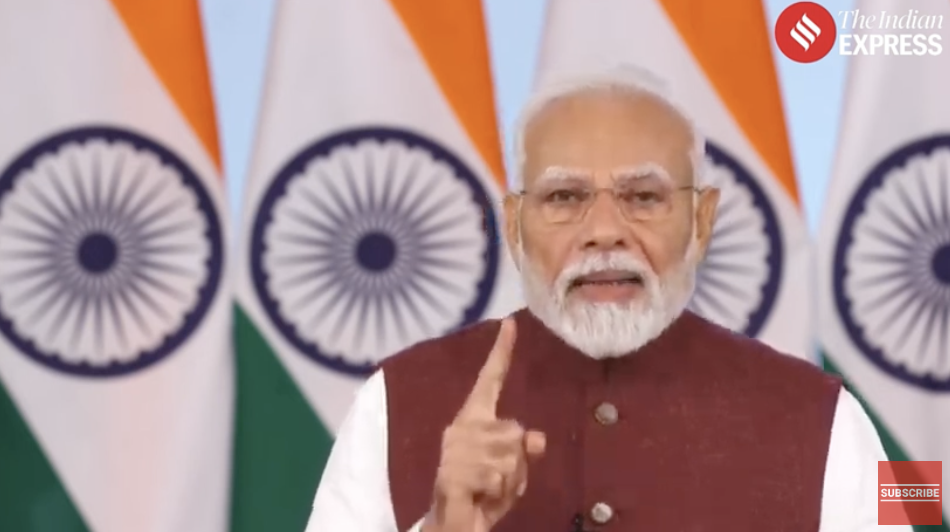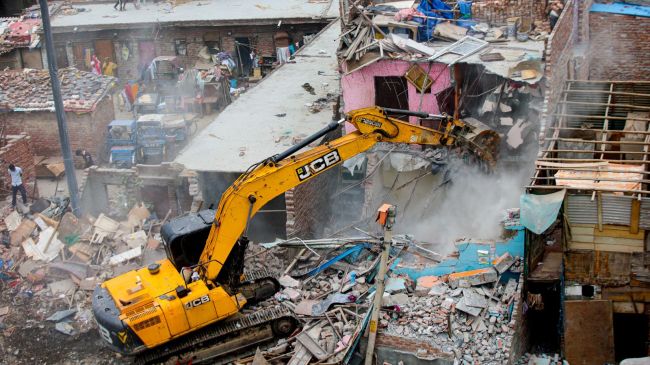
By Ravi Joshi
“When an opponent declares ‘I will not come over to your side’, I calmly say, ‘Your child belongs to us already…. What are you, you will pass on. Your descendants, however, now stand in the new camp. In a short time, they will know nothing else but this new community”.
Speech by Adolf Hitler, November 6, 1933,
Earlier this month, Mamata Banerjee and her party, the Trinamool Congress, defeated the BJP so comprehensively and decisively that Prime Minister Narendra Modi and home minister Amit Shah, who were otherwise vicariously eloquent about her for over a month, seem completely at a loss for words now. Certainly, the worsening COVID-19 situation may have compelled them to remember their constitutional duties but that did not prevent the prime minister from speaking to the governor of Bengal nor did it stop the home minister from deputing party president J.P. Nadda to enquire on the cause of post-poll violence in parts of Bengal that broke out even before the swearing-in of Banerjee for her third term in office.
Winning only 77 seats against an avowed claim of 200 seats must have hurt Shah deeply and that his hopeful calculations were shattered by Prashant Kishor would be even worse a humiliation within his own party, let alone the Bengal unit which is reportedly seething with anger.
However, while assessing the electoral defeat of BJP it is essential that we not miss the fine print. The BJP is a small, but essential part of a larger picture that is being drawn on the social and political canvass of West Bengal. For this purpose, the fact that it has won 77 seats in the assembly, compared to its earlier tally of three seats in 2016, is a huge leap in strength.
But there is a larger change, a tectonic shift in the socio-cultural life of Bengal, which is being engineered by the Rashtriya Swayamsevak Sagh (RSS) since the early 1990s. It knows that capturing the hearts and minds of the young is a generational task and the RSS is ready to wait for another two elections for the BJP to capture the state in Bengal. It believes that by then, the TMC will also dissipate and disappear, as the Left and the Congress have done in this election, being reduced to zero seats in the assembly.
It must be noted that the national elections of 2014 and 2019 have wrought an irreversible change in the nature of our democracy. They have not only firmly established the BJP in power for 10 years but have also visibilised a hitherto invisible force in the Indian political scene that drastically changes the nature of contestation for power – the RSS. And this fundamentally alters the terms of the social contract that ‘we the people of India’ resolved to give ourselves on January 26, 1950.
The RSS is not a political party, but it is far more powerful and better organised than any party. It claims to be a social and cultural organisation, but its reach and ambitions are far deeper and wider than any cultural organisation. It is the largest ‘non-political’, ‘not for profit’ voluntary organisation in the world with a reported membership of around 5-6 million in about 58,000 branches or shakhas. It has hundreds of subsidiary organisations/associations and the BJP is just one of those permitted to be actively political, contest elections and seek public office. The political wing may be in power or out of it, but that hardly changes the work of the mother organisation, nor its goals and objectives. It is a movement with a mission and that is the establishment of a Hindu rashtra.
Can Mamata fight the RSS?
The Left, particularly the CPI(M), kept the RSS from growing roots within Bengal for nearly three decades mainly because it had an ideology to counter the narrative of the Hindu Right. Its ideology promised hope of a better future, particularly for the working class, the peasants and the farmers.
Mamata Banerjee has no such overarching ideology but her policies tend to be aligned to a social democratic agenda with such populist and effective measures such as ‘Kanyashree Prakalpa (K-1, K-2, & K-3) and ‘Rupashree’ offering cash incentives and scholarships for girls to remain in schools and colleges till their marriageable age and ‘Shikshashree’ to keep Dalit students in school. Targeting young girls as beneficiaries has been the most successful of her socio-economic campaigns and has won her the support of a huge chunk of women voters. This has been probably been more critical for her landslide victory than the solid plank of Muslim votes which the BJP would like to believe is the only reason she won.
Banerjee has built a massive support base at the grassroots level, having won a preponderance of seats at the panchayat and municipal levels; yet she cannot fight the RSS as a social and cultural force. In his excellent new book Mission Bengal: A Saffron Experiment, Kolkata-based journalist Snigdhendu Bhattacharya has made a remarkable study of the steady and relentless rise of the RSS and Sangh parivar in spreading its wings in Bengal at the social, economic, educational, cultural and religious levels through a network of over 30 organisations.
The Sangh works right from the level of a six-year-old child being trained at the shakha level in Ekal Schools, to a 16-year-old youth being taught in Vidya Bharati schools to a 60-year-old woman being a member of the Shree Hari Satsang to listen to Harikathas. No other political party in India has anything remotely resembling the RSS and the Sangh parivar as its cadre.
This organisational structure is too diffuse and dispersed to be broken up and it is even more difficult to dismiss or discard its social utility. How Banerjee will confront and dismantle it or convert it into an apparatus to convey an inclusive secular humanist message will indeed be a great challenge to her leadership.
She could task her very capable lieutenants, Mahua Moitra and Derek O’Brien, to come up with an alternative vision and positive ideology of an inclusive Bengal that respects the rights of minorities and Dalits as promised in the constitution.
Deeper democracy and manifest liberal politics are the best antidotes to the ideology of the RSS and the BJP. For this, she has to shun her own authoritarian style of functioning and stop targeting dissent and opposition to her, be it in protest marches or in comments on Facebook and Twitter.
However, in order to win the ideological battle, Banerjee has to squarely counter the BJP/RSS narrative on the question of Bangladeshi migrants (which treats Hindu entrants as ‘refugees’ and Muslims as ‘infiltrators’) by coming up with a clear approach that is humane, even-handed and based on the law.
There is no denying that both Bengal and Assam have witnessed a massive demographic change in the last 30 years or more. In the absence of a coherent national policy on migrants and work permits, migrants are happy to offer votes in exchange for the ration cards and voter IDs they need to protect themselves from harassment or deportation. This process has naturally generated insecurities in the rest of the population, which the RSS and BJP have consciously exploited.
There is another pernicious issue, i.e., the question of Bangladeshi terror groups operating from West Bengal. The Khagragarh blast in Burdwan and the suspected involvement of Jamaat-ul-Mujahideen Bangladesh (JMB) is a case in point. Such incidents made it easy for the BJP to raise the slogan of a ‘Jihadi-Mukto Bangla’.
It has also been easy for the BJP to target Mamata on the basis of anecdotal evidence of the police appearing reluctant to enforce traffic rules in Muslim areas. Most chief ministers feel unnerved by the bargaining strength of Muslim MLAs and easily give in to demands they make even when they are unreasonable. In West Bengal, this has helped the Sangh keep alive the bogey of ‘minority appeasement’ even though socio-economic data makes it clear the state’s Muslims fare poorly despite allegedly being “appeased”.
If Mamata Banerjee ensures religious factors are kept out of legislation and policy-making and strictly abides by the constitution and the verdicts of courts, then the RSS/BJP can be robbed of this communal card. Of course, it can still wield the weapon of disinformation.
The way in which Banerjee has defeated BJP in this election, there should be no fear of her being disturbed for a full term in office. But then politicians have to look beyond their terms and assess the way their society is being shaped by forces operating under the radar. Polarisation along religious lines is the single biggest danger facing West Bengal in the next five years. It is in her political interest to make sure this doesn’t happen.
This story was first appeared on thewire.in






